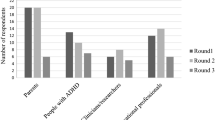Abstract
The ADHD Demystification Workshop was designed to provide children in grades two to seven with accurate information about ADHD and its treatments. The main goal was to evaluate the workshop’s effectiveness in increasing children’s knowledge about ADHD. The 25 children who participated showed an increase in their knowledge of ADHD, demonstrated more favorable opinions of both medication and psychosocial interventions, and evidenced a significant increase in their understanding of the various impacts of ADHD and potential coping strategies. The parents were found to be inaccurate in their predictions of their child’s knowledge and opinions of ADHD, and there was no relationship between the parent’s own knowledge and their child’s knowledge of ADHD. Overall, the “demystification workshop” was found to be a positive experience for the children with ADHD and shows promise as an effective means of sharing information about ADHD to latency-aged children with this disorder.
Similar content being viewed by others
REFERENCES
Barbaresi, W. J., and Olsen, R. D. (1998). An ADHD educational intervention for elementary schoolteachers: A pilot study. J. Dev. Behav. Pediatrics 19: 94–100.
Bennett, D. S., Power, T. J., Rostain, A. L., and Carr, D. E. (1996). Parent acceptability and feasibility of ADHD interventions: Assessment, correlates, and predictive validity. J. Pediatric Psychol. 21: 643–657.
Corkum, P., Rimer, P., and Schachar, R. (1999). Parental knowledge of attention-deficit hyperactivity disorder and opinions of treatment opinions: impact on enrollment and adherence to a 12-month treatment trial. Canadian J. Psychiatry 44: 1043–1049.
Gordon, M. (1991). Jumpin’ Johnny Get Back To Work: A Child’s Guide to ADHD/Hyperac- tivity. GSI Publications, Inc., DeWitt, N.Y.
Hepperlen, T. M., Clay, D. L., Henly, G. A., and Barke, C. R. (2002). Measuring teacher attitudes and expectations toward students with ADHD: Development of the Test of Knowledge About ADHD (KADD). J. Attention Diso. 5: 133–142.
Levine, M. D. (1998). Developmental Variation and Learning Disorders. Educator’s Publishing Service, Inc., Toronto, Ont.
Mash, E. J., and Wolfe, D. A. (2002). Abnormal Child Psychology. Thomson Learning, Inc., Pacific Grove, CA.
Meaux, J. (2000). Stop, Look, and Listen: The challenge for children with ADHD. Issues in Comprehensive Pediatric Nursing 23: 1–13.
MTA Collaborative Group (1999). A 14-month randomized clinical trial of treatment strategies for attention-deficit/hyperactivity disorder. Archives General Psychiatry, 56: 1073–1086.
Odom, S. E. (1996). Effects of an educational intervention on mothers of male children with attention deficit hyperactivity disorder. J. Comm. Health Nursing 13: 207–220.
Pisecco, S., Huzinec, C., and Curtis, D. (2001). The effect of child characteristics on teachers’ acceptability of classroom-based behavioral strategies and psychostimulant medication for the treatment of ADHD. J. Clin. Child Psychol. 30: 413–421.
Rostain, A., Power, T., and Atkins, M. (1993). Assessing parents’ willingness to pursue treatment for children with attention-deficit hyperactivity disorder. J. Am. Acad. Child Adolescent Psychiatry 32: 175–181.
Schachar, R., Tannock, R., Cunningham, C., and Corkum, P. (1997). Behavioural, situational and temporal effects of treatment of ADHD children with methylphenidate. The Am. Acad. Child Adolescent Psychiatry 36: 754–763.
Sciutto, M. J., Terjesen, M. D., and Bender Frank, A. S. (2000). Teacher’s Knowledge and Misperceptions of Attention-Deficit-Hyperactivity Disorder. Psychol. Sch. 37: 115–122.
Stine, J. J. (1994). Psychosocial and psychodynamic issues affecting noncompliance with psychostimulant treatment. J. Child Adolescent Psychopharmacol. 4: 75–86.
Author information
Authors and Affiliations
Corresponding author
TABLE OF CONTENTS DEMYSTIFICATION WORKSHOP FOR CHILDREN WITH ADHD
TABLE OF CONTENTS DEMYSTIFICATION WORKSHOP FOR CHILDREN WITH ADHD
Introduction (10 min)
-
Introduction of group members and facilitators through an “ice-breaker” activity
-
Discuss purpose of the group
-
Review group rules and behaviour program
ADHD Discussion (10 min)
-
Brainstorm core ADHD symptoms and associated problems
-
Review “What is ADHD” information sheet
-
13 item ADHD Checklist completed by each child
ADHD as a Brain-based Disorder and Medication-use (10 min)
-
Through the use of pictures, explore brain structures that have been implicated in ADHD
-
Discuss how every brain is “unique” (highlighting potential strengths and challenges)
-
Address myths about the etiology of ADHD through group discussion
-
Discuss in group format the use of medication in the treatment of ADHD
Break (10 min)
-
Children to fill out “How do you Relax” and “Who can Help with ADHD” worksheets
-
Children to draw a picture of what ADHD looks like to them
Film: “Jumping Johnny Get Back to Work” (Gordon, 1991) (20 min)
-
Children to watch the video which presents ADHD from a child’s point of view
-
Provide a small snack
-
Question and answer period about video
ADHD Game (10 min)
-
Children to participate in an interactive question & answer activity (based on a TV game show, Family Feud)
Concentration Cockpit (Levine, 1998) (40 min)
-
Children to self-analyze their attention control systems through completing Dr. Mel Levine’s hands-on tool, the Concentration Cockpit
-
Brainstorm strategies to help with areas of challenge
Closure (10 min)
-
Answer any remaining questions and give out completion prizes
Rights and permissions
About this article
Cite this article
MacKay, L., Corkum, P. Evaluation of a Demystification Workshop for Children with ADHD. J Dev Phys Disabil 18, 319–332 (2006). https://doi.org/10.1007/s10882-006-9019-3
Published:
Issue Date:
DOI: https://doi.org/10.1007/s10882-006-9019-3




